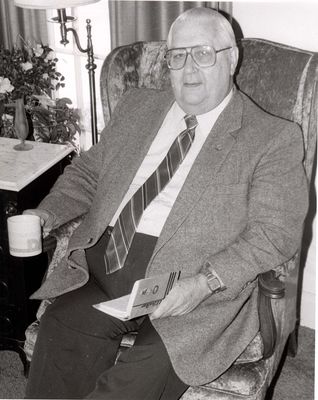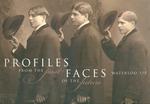Charles E. Voelker
Charlie Voelker was not a flashy politician. He was a principled man, “the
conscience of the city” who carried around a little yellow book that he would
fill with ideas to improve Waterloo.
Voelker, who served on Waterloo council for fifteen years, knew design and
beauty but above all he understood himself:
“I’m probably a good councillor but a poor politician. I’ve never been a speech maker, back slapper or baby kisser but I’ve always got the job done.”
At times he filled his little yellow book with fanciful ideas like pony rides in Waterloo Park and a butterfly farm, but more often they were visionary such as finding ways to create more parkland in Waterloo before it was too late.
In addition to his many years of community service, Voelker worked as an architectural designer, creating plans for many of the homes in the City’s upscale neighbourhoods of Colonial Acres, Westmount and Beechwood.
He became affectionately known as “Colonial Charlie” because of his penchant for traditional, symmetrical designs. True to his nature, Voelker expressed his bias simply, “I like the traditional styles where you come in and slam the door and you know you’re in a house.”
Remarkably, Voelker, who was born in 1918, was a self-taught designer, his eye for beauty showing up early as a child who loved to draw. When he was a teenager he was given some old architectural books from a family friend. Architect William Schmalz, who had designed the old Kitchener City Hall that was demolished in 1973, was planning to throw the books out when he thought of the young Voelker.
When he was seventeen years old Voelker began designing furniture for Kitchener’s Galloway Furniture Limited. In 1939, he moved to Toronto where he worked as a draftsman, drawing hydroelectric wire maps. Voelker eventually returned to the area and began designing homes for family members. He started his own business in 1947, designing homes that resembled the traditional models found in the upper New England states.
A testament to his talent is the fact that upon retirement at the age of sixty-six, he still had eighteen clients wanting his own special touch. Sadly, Voelker died in 1986, shortly after his retirement from public life.
In addition to serving on Waterloo council, Voelker had also served on the Waterloo Public School Board for seventeen years and for twenty years he was the judge for the Waterloo Court of Revision.
During his time on Waterloo council Voelker will be remembered for spearheading a campaign to establish the region’s first crematorium, library expansion, and the Oktoberfest Timeteller. He quietly improved the City in smaller ways with better designs for curbs, gutters and street lighting. He was also a key player behind the establishment of the Local Architectural Conservation Advisory Committee (LACAC).
In 1967 Voelker received the Canada Medal for service to community and country. The City of Waterloo’s Heritage Resources Department acquired Voelker’s personal collection of 250 designs. In 2003, an exhibition of his life’s work was installed by the City of Waterloo.
Charlie Voelker was remembered as a man who got things done despite his quiet, courteous approach to politics. He said once of his political career:
“Sometimes you win, sometimes you lose, sometimes you are discouraged, but every once in a while something clicks and everything is rosy again.”
Photo courtesy of the Waterloo Chronicle
Charles E. Voelker (Waterloo 150 Profile)
Description
- Creator
- Gallagher, Beth, Author
- Media Type
- Text
- Image
- Description
- To celebrate Waterloo's 150th anniversary, the Waterloo Public Library published a book called "Profiles from the Past, Faces of the Future." This book featured 150 profiles of people who helped make Waterloo what it is today. This is the digitized profile for Charles Voelker.
- Notes
- Please visit the Waterloo Public Library to enquire about physical copies of "Profiles from the Past, Faces of the Future."
The Waterloo 150 project was funded by a grant from the Waterloo Regional Heritage Foundation. Beth Gallagher wrote the profiles with the assistance of many research volunteers. Information for the profiles was gathered from a variety of sources from the community and the Ellis Little Local History Room. Notable sources include the Ellis Little Papers, newspaper clippings, local magazines and books.
- Place of Publication
- Waterloo, Ontario
- Date of Publication
- 2007
- Subject(s)
- Personal Name(s)
- Voelker, Charles E. ; Schmalz, William
- Corporate Name(s)
- Galloway Furniture
- Language of Item
- English
- Geographic Coverage
-
-
Ontario, Canada
Latitude: 43.4668 Longitude: -80.51639
-
- Copyright Statement
- Uses other than research or private study require the permission of the rightsholder(s). Responsibility for obtaining permissions and for any use rests exclusively with the user.
- Contact
- Waterloo Public LibraryEmail:askus@wpl.ca
Website:
Agency street/mail address:35 Albert Street, Waterloo, Ontario, Canada, N2L 5E2
- Full Text




